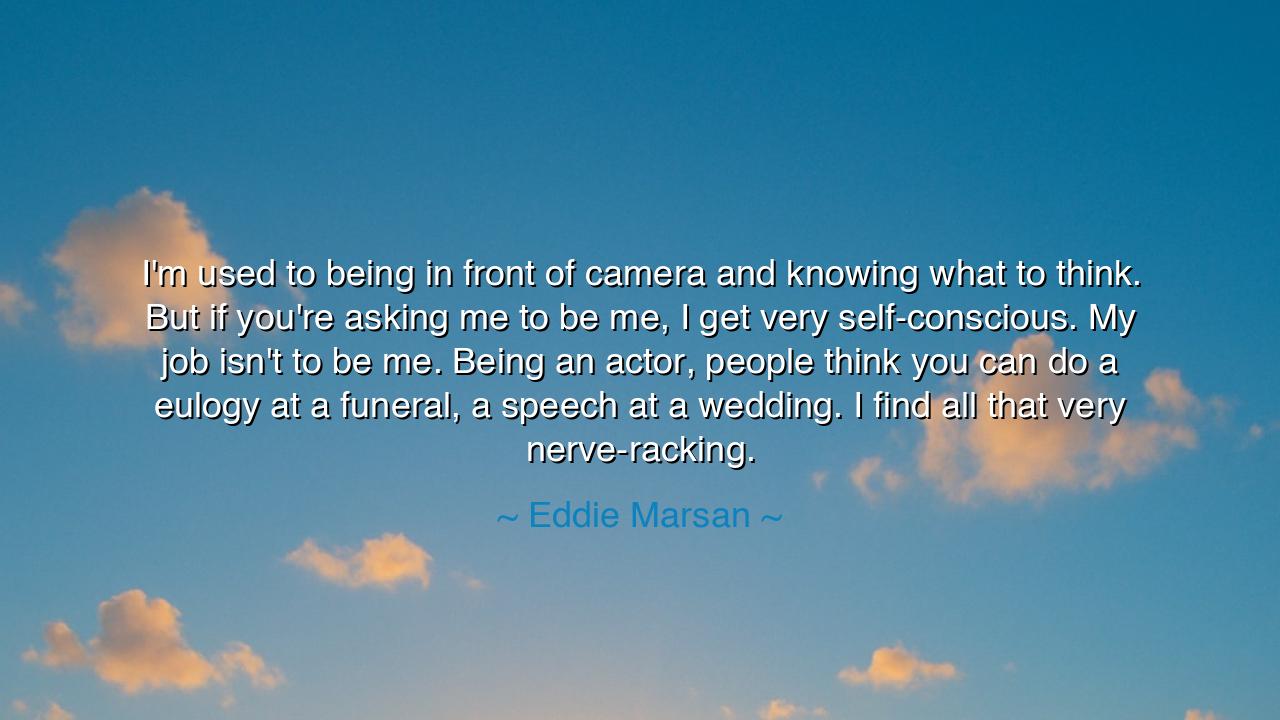
I'm used to being in front of camera and knowing what to think.
I'm used to being in front of camera and knowing what to think. But if you're asking me to be me, I get very self-conscious. My job isn't to be me. Being an actor, people think you can do a eulogy at a funeral, a speech at a wedding. I find all that very nerve-racking.






In these words, Eddie Marsan reveals the profound difference between performance and authenticity. He is a master of becoming others, of stepping into the lives and thoughts of characters crafted by writers and directors. Before the camera, he knows exactly what to think, what to say, and how to move, for the script provides a safe path to follow. Yet when he is asked to simply be himself, to speak from his own heart, he feels self-conscious and vulnerable. This is a paradox of the actor’s art — to embody countless souls, yet struggle with one’s own.
His reflection is especially poignant when he speaks of occasions like funerals and weddings, where words hold sacred weight. A eulogy is a bridge between the living and the dead, a final gift of love to one who has departed. A wedding speech is a blessing, a public expression of hope and unity for two souls beginning their journey together. In such moments, there is no script, no director, only raw emotion and expectation. Eddie’s fear is not of speaking itself, but of failing to honor the sacredness of these rites with words that are truly his own.
History offers many examples of this challenge. The ancient Greek orator Demosthenes, known for his powerful speeches, was not born with eloquence. He struggled with a stammer and trained tirelessly, speaking with pebbles in his mouth and shouting over the roar of the sea to strengthen his voice. Even he, a master of public speaking, would have understood Eddie’s fear, for to speak without preparation, with the full weight of love or grief, demands more courage than any rehearsed performance.
Eddie’s struggle reveals a universal truth: roles and masks can shield us from vulnerability, but authenticity requires us to stand bare before others. In acting, the self is hidden behind characters, costumes, and stories. In real life, there is no such barrier. To speak at a funeral or a wedding is to expose one’s heart, with all its imperfections, to the judgment of others. This is why even the bravest performers may tremble when faced with such a task.
Thus, his words carry a lesson for future generations. Do not mistake skill in performance for ease in truth. The actor’s gift is to reflect humanity through art, but the soul’s voice is a different kind of power. When called to speak from the heart — whether in sorrow, celebration, or love — embrace the trembling, for it means your words are real. In that trembling lies the deepest form of courage, greater than any role, greater than any stage.






BHBogg Hoa
Eddie Marsan’s thoughts on public speaking really make me think about the expectations people have of actors. They’re skilled at playing characters but when it comes to being themselves, it’s a whole different challenge. Do you think this pressure on actors to perform in real life situations, like weddings or funerals, is fair? Or should we allow them to be as nervous or vulnerable as anyone else in those moments?
VTVu Tram
I can’t help but feel for Eddie Marsan in this quote. It’s so true that when you’re an actor, people forget that you’re just a person, and they expect you to do things like give speeches or make eulogies as if it's part of the job. What do you think causes that disconnect between how people view actors and the reality of their comfort zones? Is it a misunderstanding of their craft, or do actors feel this way because of the expectations placed on them?
DCNguyen Dang Duy Cuong
Eddie Marsan’s comment really highlights the difference between acting and personal expression. It’s fascinating how actors, despite their comfort on camera, can feel so self-conscious when asked to speak as themselves. Why do you think that is? Do you think society places too much pressure on actors to be great at everything, like public speaking, just because they’re skilled performers?
QKQuoc Khanh
I really resonate with Eddie Marsan’s perspective on being in front of the camera. It’s interesting how being an actor means performing as someone else, but when it comes to just being yourself, it feels so much more vulnerable. Do you think people often assume actors are natural in all situations, like public speaking or personal moments, just because they’re good at acting? Is it the pressure of being ‘on’ that makes those moments nerve-racking?